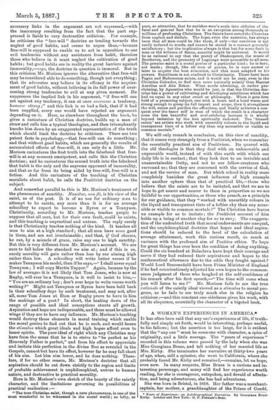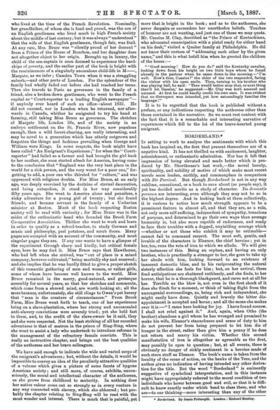A WOMAN'S EXPERIENCES IN AMERICA.*
Ix has often been said that any one's experiences of life, if truth- fully and simply set forth, would be interesting, perhaps useful, to his fellows; but the assertion is too large, for it is evident that the "anyone" mast be some one with character, a spice of originality, and a little courage. The "years of experience" recorded in this volume were passed by the lady when she was Miss Georgiana Bruce, and tell nothing of her married life as Mrs. Kirby. She terminates her narrative at thirty-two years of age, when, still a spinster, she went to California, where she probably found Mr. Kirby and remained,—remains, let us hope, even now. In many respects, Miss Bruce is a curious and in- teresting personage, and many will find her experiences worth reading, for she is courageous, outspoken, and devoid of affecta- tion, and being adventurous, she has bad adventures.
She was born in Bristol, in 1818. Her father was a merchant- captain, her mother, a granddaughter of the Prince of Condd,
• Peers of Experinwe: an Autobiographical Narrative By Georgians Brum Kirby. London and New York G. P. Pawn's Bone.
who lived at the time of the French Revolution. Nominally, her grandfather, of whom she is fond and proud, was the eon of an English gentleman who lived much in high French society about the middle of last century; but it was always" understood" that the wife of that English gentleman, though fair, was frail. At any rate, Mrs. Bruce was "silently proud of her descent" from a Prince of the House of Bourbon, and her daughter does not altogether object to her origin. Brought up in luxury, the child of the sea-captain is soon doomed to experience the hard- ships of poverty, and the earlier part of the book is bright with the reminiscences of a singularly anomalous child-life in M—, Margate, as we infer ; Camden Town when it was a straggling enburb,—and other parts of London. For the splendour of the family had wholly faded out before she had reached her teens. Then she travels to Paris as governess in the family of a friend, also a broken-down gentleman, who went to the French capital as " Court-reporter to a leading English newspaper"— if anybody ever heard of such an office—about 1833. He did not succeed, nor in London when he returned, nor after- wards in Canada, whither he emigrated to try his hand at farming, still taking Miss Bruce as governess. The sketches of Margate life, London life, and of the society in an embryo settlement on the St. Francis River, now populous enough, then a wild forest-clearing, are really interesting, and may be novel to a generation which has utterly outgrown and forgotten the things and fashions prevailing when George and William were Kings. In some respects, the book might have been called "An Emigrant's Experiences ;" for when the " Court- reporter" had failed as a farmer and had brought the girl back to her mother, she soon started afresh for America, having come to the conclusion that "England was the very best place in the world for a rich person, and the very worst for a poor one," for- getting to add, a poor one who thirsted for " culture," and was oppressed with religions doubts. For Miss Bruce, at an early age, was deeply exercised by the doctrine of eternal damnation, and being outspoken, it stood in her way considerably fifty years ago. She went to America alone and penniless, a risky adventure for a young girl of twenty ; but she found friends, and became servant in the family of a Unitarian minister at Boston. Mach of the book respecting Boston society will be read with curiosity ; for Miss Brace was in the midst of the enthusiastic band who founded the Brook Farm Co-operative Association. Thither she went to work and learn in order to qualify as a school-teacher, to study German and music and philosophy, peel potatoes, and scrub floors. Many pages are occupied with an account of the community, and most singular pages they are. If any one wants to have a glimpse of the experiment through sharp and kindly, but critical female eyes, here he may find it. Miss Bruce says that Hawthorne, who had left when she arrived, was "out of place in a mixed company, however cultivated," being morbidly shy and reserved; and she implies that he was hardly fitted to give a proper sketch of this romantic gathering of men and women, or rather girls, some of whom have become well known to the world. Miss Bruce remained in the merry, good-natured, and grotesque assembly for several years, so that her sketches and comments, which come from a shrewd mind, are worth looking at; all the more because, unfortunately, she still clings to Owen's pet heresy that "man is the creature of circumstances." From Brook Farm, Mies Bruce went forth to teach, one of her experiences being on a slave-plantation, where her strong and unconcealed anti-slavery convictions were severely tried; yet she held fast, to them, and, to the credit of the slave-owner be it said, they and she were respected. Not the least striking of all her recorded adventures is that of matron in the prison of Sing-Sing, where she went to assist a lady who undertook to introduce reforms in the management of the refractory female convicts. This is really an instructive chapter, and brings out the best qualities of the authoress and her brave colleagues.
We have said enough to indicate the wide and varied scope of the emigrant's adventures ; but, without the details, it would be impossible to convey an idea of the peculiarly attractive qualities of a volume which gives a picture of some facets of bygone American society ; and still more, of course, exhibits, uncon- sciously, the moral and intellectual character of the authoress, as she grows from childhood to maturity. In nothing does her native valour come out so strongly as in every venture in any way connected with slavery, which she abhorred ; but pro- bably the chapter relating to Sing-Sing will be read with the most wonder and interest. There is much that is painful, Jet
more that is bright in the book ; and as to the authoress, she never despairs or surrenders her unorthodox beliefs. Touches of humour are not wanting, and just one of these we may quote. Mr. Cassius M. Clay, described as "the Prince of Kentuckians, who advocated emancipation with a pistol ready for either hand on his desk," visited a Quaker family at Philadelphia. He did not know their custom of " addressing each other by the given name," and this is what befell him when he greeted the children of the house :-
"' Good morning ! How do you do?' said the Kentucky cavalier, looking down from his height on two little boys whom he found already in the parlour when he came down in the morning.—`I'm well. How's thee, Cassius ?' the elder of the two responded, facing the visitor with his open smile. Then, turning to his brother who was playing ball, be said: Thee would better stop that, or next thing thee'll hit Cassius,' he suggested.—Hr. Clay was both amazed and amused. At first he could hardly credit his own ears. It was evident that no disrespect was intended, yet how astoundingly familiar the language!"
It is to be regretted that the book is published without a preface, or any indications respecting the authoress other than those contained in the narrative. So we most rest content with the fact that it is a remarkable and interesting narrative of experiences which fell to the lot of the brave-hearted young emigrant.



































 Previous page
Previous page